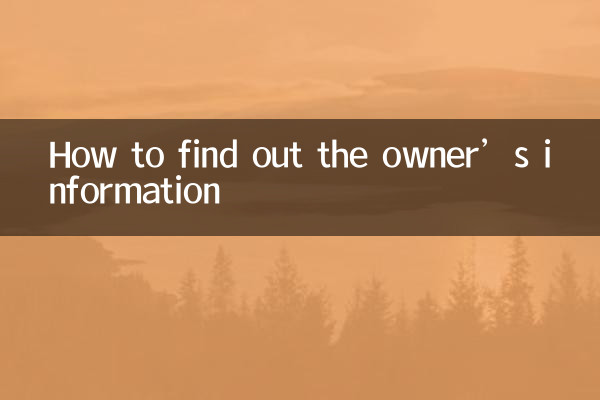How to find out the owner’s information
Whether in a real estate transaction, renting, or legal dispute, knowing the owner's information is a need for many people. Whether it’s to verify the authenticity of a property or contact the owner, it’s crucial to know the right way to make inquiries. This article will detail several legal ways to help you quickly obtain homeowner information.
1. Inquiry through real estate certificate

The real estate certificate is the most direct document proving the ownership of the property. If you have access to the original or copy of the real estate certificate, you can directly check the owner's name, ID number and other information on it.
| Query method | Materials required | Things to note |
|---|---|---|
| Original real estate certificate | None | Need to be provided by the homeowner himself |
| Copy of real estate certificate | Landlord authorization letter | Official seal required |
2. Inquiry through the Real Estate Registration Center
Real estate registration centers in various regions maintain detailed property information. You can bring relevant materials to the local real estate registration center to apply for inquiry.
| Query conditions | Materials required | query limits |
|---|---|---|
| My real estate | ID card | Unlimited |
| Other people's real estate | Notarized power of attorney | Justifiable reason required |
3. Inquiry through the court
If you are involved in a real estate dispute, you can apply to the court to check the owner's information. The court will obtain information from relevant departments based on case needs.
| Query method | Applicable situations | time required |
|---|---|---|
| Inquiries during litigation | Real estate dispute cases | 3-7 working days |
| Executing query | enforcement cases | 1-3 working days |
4. Inquire through the property company
Property companies usually have basic information about community owners. You can try to search through the property, but please note that the property may not disclose the owner's privacy at will.
| Query method | success rate | Things to note |
|---|---|---|
| Ask directly | lower | Reasonable reasons are required |
| Formal correspondence inquiry | higher | The official seal of the unit is required |
5. Inquiry through the online platform
Some government websites and third-party platforms provide real estate information query services, but usually only basic information can be found.
| Platform name | Query content | cost |
|---|---|---|
| Government Service Network | Property registration information | free |
| Real estate agency website | Owner contact information | Membership fee |
Things to note:
1. There must be a legitimate reason to inquire about other people's real estate information, otherwise it may involve an invasion of privacy.
2. Obtaining other people’s information through illegal means may face legal risks.
3. It is recommended to give priority to formal inquiries and seek help from a lawyer if necessary.
Mastering the correct query method not only allows you to quickly obtain the information you need, but also avoids legal risks. Hope this article can provide you with valuable reference. For further information, it is recommended to consult a legal professional.

check the details

check the details